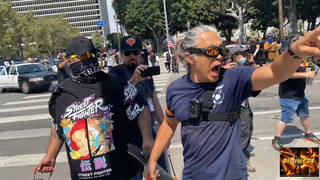
As more details emerge about those who attacked the U.S. Capitol on January 6, it’s becoming clearer that the insurrection was not the work of a “fringe” group, but rather the result of a decades-long conservative effort to undermine democracy, according to author Brendan O’Connor. “The events of January 6 were not just months, but years, decades, in the making,” says O’Connor, who notes that major Republican donors and prominent conservative groups were connected to the Trump rally that immediately preceded the Capitol riot.
Transcript
AMY GOODMAN: This is Democracy Now! I’m Amy Goodman, with Nermeen Shaikh. This is The Quarantine Report, as we end today’s show looking at the deadly January 6th insurrection at the Capitol.
Federal prosecutors have charged former New York City police officer Thomas Webster with assault with a deadly weapon during the insurrection. Prosecutors say he went after a Capitol Police officer, quote, “like a junkyard dog — teeth clenched and fists clenched,” beating him with a metal pole and trying to gouge out his eye. Prosecutors say video shows Webster beat the officer with his hands and ripped their gear off, causing them to choke, because it, quote, “cut off the officer’s air.” The video of this is horrifying. Webster is a former U.S. marine and a 20-year veteran of the NYPD, who once helped guard City Hall and the mayor’s mansion.
This comes as the Senate held its first public hearing Tuesday on the insurrection, where security officials blamed intelligence failures. The House Judiciary Committee followed up Wednesday with a hearing on the rise of domestic terror. Some Republican members tried to compare the January 6th attack to protests against police killings of Black Americans and insisted antifa is a threat. This was Democratic Congresswoman Cori Bush’s response.
REP. CORI BUSH: We cannot equate white nationalist violence with what my colleagues on the right stated is left-wing extremist violence. Equating a righteous movement for justice with hateful and racist white nationalism is outright ignorant and disingenuous on your part. But for white supremacy, in which you benefit, we would not be in the streets demanding to be heard. We’re demanding to be heard to save lives. And let me say this: Had you fixed it before now, we wouldn’t be here. And there are not “fine people on both sides.” There is simply no comparison.
AMY GOODMAN: Meanwhile, during this week’s confirmation hearings for President Biden’s nominee to become the next attorney general, Merrick Garland told the Senate Judiciary Committee he would prioritize prosecuting the white supremacists who stormed the Capitol January 6th. He compared the task to his prosecution of the Oklahoma City Federal Building bombing in the 1990s. When Democratic Senator Dick Durbin of Illinois asked Garland if the deadly insurrection was a, quote, “one-off,” this was Judge Garland’s response.
JUDGE MERRICK GARLAND: I don’t think that this is necessarily a one-off. FBI Director Wray has indicated that the threat of domestic terrorism, and particularly of white supremacist extremists, is his number one concern in this area. This is coupled with an enormous rise in hate crimes over the past few years. There is a line from Oklahoma City, and there’s another line from Oklahoma City all the way back to the experiences that I mentioned in my opening with respect to the battles of the original Justice Department against the Ku Klux Klan. We must do everything in the power of the Justice Department to prevent this kind of interference with the policies of American democratic institutions. And I plan, if you confirm me for attorney general, to do everything in my power to ensure that we are protected.
AMY GOODMAN: This comes as former President Trump is set to reemerge Sunday as the headline speaker at CPAC — that’s the Conservative Political Action Conference — where he’ll try to keep alive his false claims of election fraud and reportedly will talk about running for president again in 2024.
Well, for more, we’re joined by reporter and author Brendan O’Connor, whose recent book is titled Blood Red Lines: How Nativism Fuels the Right, his latest article for The Guardian headlined “The Capitol riot wasn’t a fringe 'uprising'. It was enabled by very deep pockets.”
Welcome to Democracy Now!, Brendan. Talk about those pockets. Talk about this insurrection and who enabled it.
BRENDAN O’CONNOR: Thank you for having me.
Yeah, I mean, the events of January 6th were not just months, but years, decades, in the making. And I think that Merrick Garland is correct to say that there’s an ideological lineage reaching all the way back to the KKK and the Justice Department’s struggles against it, and really even further, to Reconstruction and the Civil War. This is a current and a tendency in American politics that has been with us since the beginning and is being given expression and being encouraged by the conditions of crisis that we are all living in now.
AMY GOODMAN: Talk specifically about the funding of what took place on January 6th.
BRENDAN O’CONNOR: So, on January 6th, the rally that then-President Trump spoke at that preceded the siege of the Capitol was funded, and the infrastructure for it was provided by, a slew of right-wing organizations that have gotten funding from various right-wing — from the right-wing donor class, that have been with us, and, you know, they were involved in funding the tea party movement, that have been involved in blocking various Democratic efforts at passing progressive legislation over the years, and then saw that this was an opportunity to try to ingratiate themselves and support the militant white nationalist factions within the Republican Party that Trump finds to be his base.
NERMEEN SHAIKH: So, Brendan, as we heard earlier, Biden’s nominee for attorney general, Merrick Garland, has said that this will be his top priority, prosecuting the white supremacists who stormed the Capitol on January 6th. Now, given the fact that you’ve talked about the funding behind this, how do you think he can go about doing this, if he is confirmed?
BRENDAN O’CONNOR: That’s a good question. I think that the Justice Department’s investigations — and already we’ve seen that the charges that have been brought have shown us a lot about the social dynamics of what happened on January 6th and in the weeks and months leading up to it, the way that these different groups are organized and the way that more organized groups interact with the Trump rank and file. I’m not optimistic that Merrick Garland’s prospective investigation will be able to get to the root causes of how this happened and why this happened, not through any individual fault of Merrick Garland’s or any individual prosecutor within the Justice Department, but simply because that’s not the role of the Justice Department. They don’t have the ideological framework or the political toolbox to be able to get to the root of these problems.
NERMEEN SHAIKH: And, Brendan, could you also elaborate on some of the groups that have been identified as having participated in this attack, including the Proud Boys, Oath Keepers and so on?
BRENDAN O’CONNOR: For sure. So, the Oath Keepers are an older group that were very active during the Obama administration, that kind of served as a bridge between the far-right patriot movement that emerged during the late '80s and ’90s. Oath Keepers draw their base of support from law enforcement and military veterans. There's a lot of overlap between these two groups.
They were active on January 6th, alongside the Proud Boys, who are a newer group that were founded in 2016 but were sort of laughed off by many of the more hardcore white nationalists for several years, until now, in 2019, 2020, stepping into a power vacuum on the far right that was left by the collapse of the so-called alt-right. And the Proud Boys are basically a street-fighting organization. Their base of support is primarily in the Pacific Northwest, but they’re all over the country. And they, similarly to the Oath Keepers, serve as a bridge between the more ideologically hardcore far right and the Trump base. And they do this by deploying the tropes and mythology of QAnon, of evangelical Christianity, of ultranationalist patriotism, all in service of open street violence.
AMY GOODMAN: During the hearing on Tuesday, Republican Senator Ron Johnson of Wisconsin used his questioning to read from a Federalist article promoting a conspiracy theory that the rioters infiltrated a crowd of well-meaning and festive Trump supporters.
SEN. RON JOHNSON: “A very few didn’t share the jovial, friendly, earnest demeanor of the great majority. Some obviously didn’t fit in.” And he describes four different types of people: plainclothes militants, agents provocateurs, fake Trump protesters and then disciplined, uniformed column of attackers. I think these are the people that probably planned this.
AMY GOODMAN: So, Ron Johnson keeps putting forward that this was antifa. Then you have Marjorie Taylor Greene, the QAnon congresswoman, who said the same thing. And yet it now has come out, with video that’s emerged of one of her closest friends, one of the Trump-supporting protesters, marching along there and talking about the organizing of this event, so she knows full well exactly who was doing this, though she denied that that is who was doing it. Brendan O’Connor, if you can talk about where you feel this all needs to lead? And are these groups getting stronger?
BRENDAN O’CONNOR: Are these groups getting stronger? That’s a very good question, and it’s hard exactly to say. I think a lot of it will depend on how the fractures within the Republican Party writ large resolve themselves. If Congresspeople like Marjorie Greene and senators like Ron Johnson are able to take over the party, then this becomes a habitable refuge for the organized far right. If, on the other hand, the more mainstream donor class and sections of the ruling class that affiliate with the Republican Party are able to reassert control, then the far right will take on a more anti-state character, and the accelerationist and fascist factions will gain influence, I think. And that can — that will lead in a different direction, neither of which are very — neither of which I’m very optimistic about.
AMY GOODMAN: And we have 20 seconds, but the subtitle of Blood Red Lines, your book, How Nativism Fuels the Right. You have Stephen Miller now briefing conservative congressmembers, Trump coming out at CPAC Sunday. Your thoughts?
BRENDAN O’CONNOR: Yes. I think that the nativist influence is going to continue to rise, especially as the climate crisis deepens and more and more people around the world are displaced and come to countries like the United States seeking safety and refuge and comfort. This is going to provoke a reaction that those of us on the left and in the Democratic Party need to be conscientious and sensitive to as we think about how to build a world that can accommodate everyone.
AMY GOODMAN: We’re going to have to leave it there. Brendan O’Connor, author of Blood Red Lines. I’m Amy Goodman, with Nermeen Shaikh. Stay safe.













Media Options